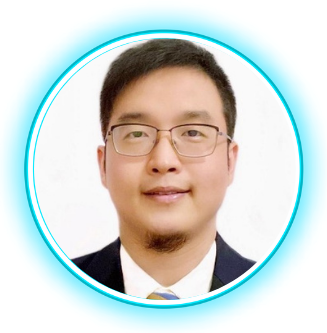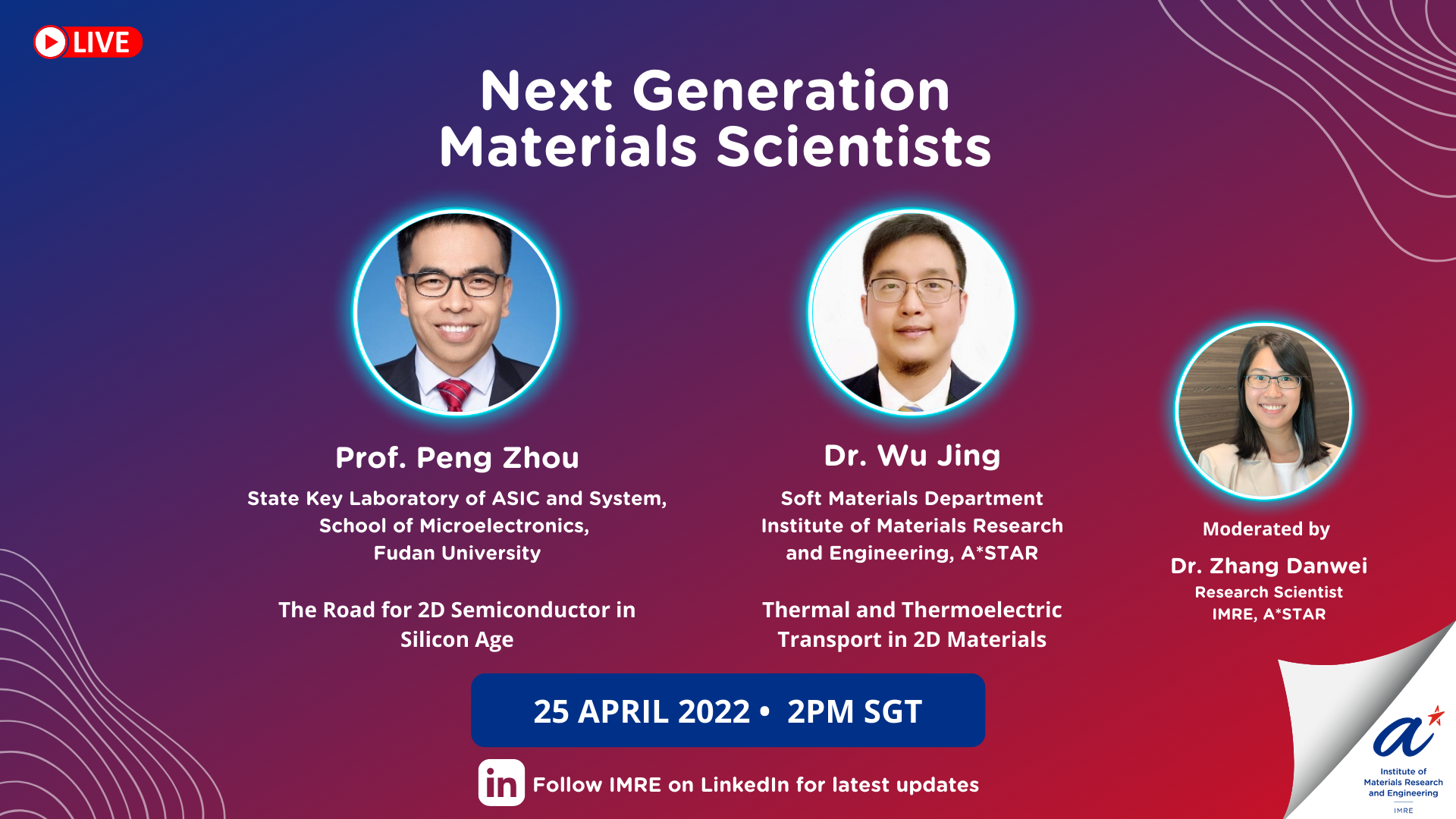Next Generation Materials Scientists
Date
Speakers
25 April 2022
2:00pm to 3:30pm
(SG Time)

Prof. Peng Zhou
State Key Laboratory of ASIC and System
School of Microelectronics
Fudan University, Shanghai, China
Title: The Road for 2D Semiconductor in Silicon Age
Abstract
As the feature size of silicon-based integrated circuits (ICs) approaches the physical limit, short-channel effects appear, gate control attenuates, and leakage current increases, which seriously affects transistor performance and causes chip failure. Due to the inherent thickness of bulk silicon, the physical area cannot be further reduced, which restricts the area efficiency of silicon-based ICs. In addition, the speed mismatch between memory readout and logic operation, and the separation of memory and computing units together form the memory wall bottleneck in silicon-based ICs. With unique characteristics, including no dangling bond surface, atomic-level thickness, abundant adjustable energy bands, excellent optical electrostatic properties etc., two-dimensional (2D) materials have the potential to enhance gate control, reduce leakage, improve energy and area efficiency, and realize the integration of perception, memory and computing. This report discusses the roadmap for the fusion of 2D materials and silicon ICs, including alleviating the problems faced by silicon ICs from the application of 2D materials in gate-all-around, memory and logic transistors, and enabling the creation of an all-in-one sensing, memory and computing system. Finally, it provides an outlook on the challenges and promising paths to fusing 2D materials with silicon ICs for large-scale applications.
Biography
Peng Zhou is a full professor at the State Key Laboratory of ASIC and system, School of Microelectronics, Fudan University, China. He received his B.S. (2000) and Ph.D. (2005) degrees in physics from Fudan University, China. He has invented a new type Flash memory technology with both high speed and non-volatile, and realized high-area-efficiency single-transistor logic in-situ memory technology, and obtained high-performance storage devices, high-efficiency algorithms and chips. Currently, Professor Zhou is interested in novel high-efficiency and low-power electronic devices based on layered materials, focusing on the application in memory, synaptic electronics, and neuromorphic systems. He has published more than 200 scientific papers on Nature Nanotechnology, Nature Electronics, and Nature Communications etc.

Dr. Wu Jing
Scientist
Soft Materials Department, Institute of Materials Research and Engineering, A*STAR
Title: Thermal and Thermoelectric Transport in 2D MaterialsAbstract
Two-dimensional (2D) semiconductors hold immense promises towards sustaining Moore’s law owing to their atomically thin nature. Here, we mainly focus on understanding the unique mesoscopic transport properties of atomically thin 2D materials and related heterostructure systems. By employing electrical and optical measurements, imaging and other transport measurement techniques, we investigate and explore the transport dynamics arising from interactions between electrons, phonons and photons, as well as the complex interplay of new physical phenomena in 2D materials over a wide range of temperatures. From which, we can effectively manipulate the electrical, thermal, and thermoelectric transport of these quantum systems towards transforming and developing novel technological applications in high-performance electronics, energy harvesting, sensing, and computing devices
Biography
Dr. Jing Wu is currently the leading scientist in the Nano Electronic and Thermal Transport (NETT) group at the Institute of Materials Research and Engineering (IMRE), Agency for Science, Technology and Research (A*STAR) in Singapore. He also holds an Adjunct Assistant Professorship at the Department of Materials Science and Engineering, National University of Singapore (NUS). He received his bachelor’s degree in Physics from Zhejiang University in 2010 and his PhD degree in Physics from NUS in 2015. His current research interests focus on understanding the mesoscopic transport behaviour in the nanoscale regime, ranging from electrical, thermal, thermoelectric to excitonic transport.
A*STAR celebrates International Women's Day

From groundbreaking discoveries to cutting-edge research, our researchers are empowering the next generation of female science, technology, engineering and mathematics (STEM) leaders.
Get inspired by our #WomeninSTEM
.png?sfvrsn=b59474e9_3)
